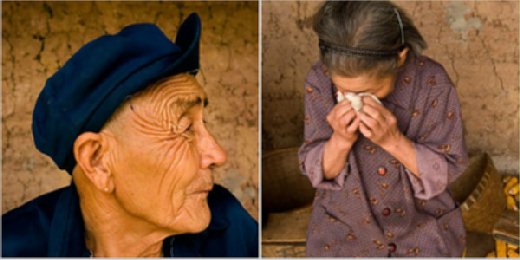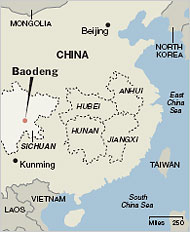

 字體:小 中 大
字體:小 中 大 |
|
|
|
| 2006/11/08 18:12:17瀏覽813|回應3|推薦6 | |
Rush for Wealth in http://www.nytimes.com/2006/11/03/world/asia/03aging.html?_r=1&oref=slogin BAODENG, China — If having children is a mark of wealth, Gao Shenmu and Wang Xiuying, a farming couple in their 70s, surely rank as rich. They raised six children in this rolling, fertile countryside before But for just that reason, their very Chinese dream of security in old age, built on the next generation’s obligation to them, has badly foundered. The sons moved, but they left their own two young children behind to be cared for. They rarely visit and collectively send just $30 or $40 a year home. Mr. Gao and Ms. Wang make do at harvest time, spending two weeks in backbreaking labor that once took them less than a week to perform. The couple’s experience is increasingly commonplace. The chief of their hamlet put its predicament this way: “Knock on 10 doors, and 9 of them will be opened by old people.” And across much of the Chinese countryside the situation is the same, with villages emptied of their working-age populations, leaving behind small children and grandparents. And as “The reality of China today is that the needs of the elderly cannot be taken care of by the social system,” said 翟, a member of the 黑龍江 Provincial People’s Congress. “Most of them must rely on younger people, but today’s young people pay attention to their own children, and not to their elders.” Mr. 翟, who is also an executive of a private coal company, personally financed a study of the situation of the elderly in the countryside so that he could recommend new laws to the government concerning care of senior citizens. He said he was shocked into action by the death of an old couple in his own hometown, who had essentially been abandoned and were not discovered for days. “In our society, children have become the highest good, and old people have become nothing,” he said. 賀雪峰, an expert in rural governance at 華中科技大學, said that although the central government has begun re-emphasizing development of the countryside since last year, in a push to reduce the gap between haves and have-nots, the situation for the rural elderly is deteriorating. “New priorities have been set, but all of the emphasis is on economic development,” Mr. 賀 said. “The traditional values of our villages have been devastated. One half of the population is changing very fast, and the other is clinging to its values. Under the circumstances, life becomes tougher and tougher for the elderly.” Some who have been abandoned have sued their children for support. Earlier this year in another part of 四川省, 田貴芳, a 69-year-old widow, successfully sued her son and daughter for abandonment. After her husband died in 2003, Ms. 田 lived with her son for a time, but was kicked out. When her daughter refused to take her in, she went to court, winning a judgment allowing her to live with her daughter and obliging her son to pay about $12 a month in support. Some experts on aging in 原新, a demographer at 南開大學, said that at the end of 2005 China had 147 million people over the age of 60, and 80 percent of them in rural areas. Official estimates put the country’s floating population, or internal migrants, at 147 million, a number that consists overwhelmingly of adults in their prime who have left the countryside for the booming economies of the eastern coast. Most of them are from provinces in east-central China, like 湖北, 湖南, 安徽 and 四川. 四川, “With the development of the economy, in the future, the floating population will continue to grow,” said Mr. 原, who conceded that little academic attention had been focused on the impact on China’s villages of this huge population outflow. In some respects, one need not wait for the studies to come in. Experts like Mr. 原 say that children raised by rural grandparents, who are often illiterate, will be strongly disadvantaged. And rural incomes are unlikely to rise when heavy farm labor falls to the elderly. Ms. Wang, in her little village in 四川, said she and Mr. Gao worked as hard as they could, but it was not enough. “We can’t work as hard as before, because when we do too much, we feel dizzy,” said Ms. Wang, 74. One son returned this year to help at harvest time, but then went back to 昆明, the capital of 雲南省. “After all is said, we miss them, particularly when we get sick,” she added, her eyes welling with tears. “I broke my arm last year and could not even lift it. Our son in 雲南 came back to see me and help out, but the ticket is expensive for him. I know that.” Ariana Lindquist for The New York Times Gao Shenmu, left, at home in Baodeng, the village where he and his wife, Wang Xiuying, raised six children. Three of their four sons migrated to get jobs, leaving two grandchildren to be cared for. The sons rarely visit. 美國《紐約時報》刊文稱 農村出現“老無所養”危機 http://paper.people.com.cn/hqsb/html/2006-11/06/content_11578395.htm 如果孩子是財富的標誌,那生活在四川省寶登(音)村70多歲的農民夫婦高慎穆(音)和王秀英(音)一定會被看成是富人。在中國實行“計劃生育”政策前,他們在這塊肥沃的土地上養育了6個孩子,其中4個是兒子。隨著中國東部地區的繁榮,有3個兒子隨著打工大軍進城了。 正是由於這個原因,指望下一代人盡義務的“老有所養”的中國夢在他們家出現了危機。 兒子們很少回家,每年只往家寄240到320元錢,卻把年幼的孩子留給年邁的父母照管。在收穫莊稼的季節裏,高和王總是疲於奔命,筋疲力盡的勞作經常持續兩周,而以前他們家不到一周就能幹完地裏的活。這對夫婦的經歷在中國越來越普遍,很多農村只剩下小孩和爺爺奶奶,年輕人都外出打工了。寶登村的村長形容這種困境時說:“敲10家的門,有9戶肯定是老人開門。”自20多年前中國開始經濟改革,數千萬人走上打工之路,其中絕大多數是農民到城市尋找機會。中國是快速老齡化的社會,而在農村,人口流動使老人突然佔據了絕對優勢。 隨著經濟不斷發展,源於儒家學說、有2000多年歷史的傳統、以前被認為是“雷打不動的”贍養老人的義務,正面臨被拋棄的危險。 “當今中國的現實是社會體系還不能照顧到所有老人。”黑龍江省一名人大代表說,大多數老人必須依靠年輕人贍養,可今天的年輕人卻把注意力放在了自己孩子而不是父母身上,“孩子被當成最有價值的寶貝,老人卻一錢不值”。 農村專家何學鋒(音)說,儘管政府一再強調發展農村,縮小貧富差距,但農村地區老人的境遇仍在下降,“傳統價值觀被破壞了。有一半人變化太快了,只有另一半人還堅守著這一價值觀。在這種情形下,老人的生活變得越來越艱難。” 一些被拋棄的老人甚至到法院控告子女,要求他們盡贍養義務。今年早些時候,四川一位69歲的寡婦就控告兒女不贍養。自殺現象在老年人群中也有擴散的趨勢。 “我們非常想念他們(兒子),尤其是生病時。”王秀英眼裏噙滿淚水,“去年,我的胳膊摔斷了,抬都抬不起來。在雲南打工的兒子回來幫助我渡過難關,但車票對他來說太貴了。”▲(摘自11月3日美國《紐約時報》,原題:隨著中國城市繁榮發展,老人們被拋在了一邊,作者霍華德·W·佛倫奇,陳一譯) 《環球時報》 ( 2006-11-06 第06版 ) 黑龍江省人大代表翟玉和:農村孝道出了問題 http://culture.people.com.cn/GB/22226/45285/45288/4174519.html 2006年03月07日王新友【檢察日報】 從2005年11月初至12月底,歷時50天,踏訪全國31個省區,行程5萬多公里,走訪了萬餘名農村老人。黑龍江省人大代表、雞西市佳和礦產資源開發有限公司董事長翟玉和自費出資10萬元組織的三個調查組對中國農村的養老現狀進行了調查,調查展示了我國部分地區農村老人的生存現狀。
|
|
| ( 時事評論|兩岸 ) |











